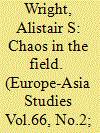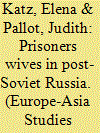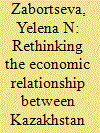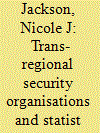| Srl | Item |
| 1 |
ID:
128250


|
|
|
|
|
| Publication |
2014.
|
| Summary/Abstract |
This article traces the creation, experiences and success of Karelia's food supply detachments during the Russian Civil War and focuses on three target provinces: Kursk, Simbirsk and Saratov. It emphasises the early political and economic stumbling blocks faced by the Bolsheviks in their attempts to implement the party's food supply policies in the periphery and indicates that, although the Soviet food supply system by mid-1919 was more centralised and resistance from local soviets lessened, improvements were only relative to the more chaotic conditions of the previous year.
|
|
|
|
|
|
|
|
|
|
|
|
|
|
|
|
| 2 |
ID:
128248


|
|
|
|
|
| Publication |
2014.
|
| Summary/Abstract |
Interpersonal trust in post-communist societies is particularly low, and is often cited as an impediment to democratic consolidation. One way in which countries in Central and Eastern Europe and the former Soviet Union have tried to build trust is through transitional justice measures, particularly lustration or vetting policies. There is a direct relationship postulated between lustration, transitional justice, and social trust building. This paper tests this assumption by examining the impact of both targeted lustration and broader transitional justice programmes on social trust. The study finds there is a divergent impact of lustration on trust, both building particularised trust in social institutions and undermining generalised interpersonal trust.
|
|
|
|
|
|
|
|
|
|
|
|
|
|
|
|
| 3 |
ID:
128247


|
|
|
|
|
| Publication |
2014.
|
| Summary/Abstract |
The identity of a prisoner's wife is often a shameful societal stigma. Yet Russia's unique history of imprisonment has provided an unusually positive trope for women who have to come to terms with their partners' incarceration: the 'Decembrist wife' (dekabristka). This trope originated in the aftermath of the 1825 'Decembrist' uprising-the first anti-monarchist revolt in modern Russian history. A handful of wives of the perpetrators voluntarily joined their husbands in Siberian exile and, in leaving behind families and comforts, created a precedent to be glorified for future generations. Upheld in Russian national mythology as a model of the exemplary wife, the dekabristka identity lives on. This paper examines its enduring power and significance in contemporary Russia
|
|
|
|
|
|
|
|
|
|
|
|
|
|
|
|
| 4 |
ID:
128249


|
|
|
|
|
| Publication |
2014.
|
| Summary/Abstract |
Although scholars have made great progress over the last few years studying the international dimension of democratisation, questions remain about this complex relationship, especially about the understudied area of external promotion of authoritarianism. This article seeks to develop more refined understanding of specific mechanisms linking one type of external involvement, financial assistance, to regime change. Financial assistance can increase the capabilities of either pro-democratic or pro-authoritarian elites and therefore contribute to regime change. These mechanisms are examined by looking at democracy assistance in Slovakia and Belarus and Russia's support for authoritarianism in Belarus.
|
|
|
|
|
|
|
|
|
|
|
|
|
|
|
|
| 5 |
ID:
128251


|
|
|
|
|
| Publication |
2014.
|
| Summary/Abstract |
According to their governments, economic relations between Kazakhstan and Russia-the two largest post-Soviet countries-have been exceptionally solid and robust. However, statistical data demonstrate that Russian investments in Kazakhstan's economy have been weak, and that Kazakhstan has only recently increased investment in the Russian economy. This raises the question of whether relations between the two countries have been more uneven than has been claimed officially. The article also explores the influence of off-shore investments via third countries and other aspects of the bilateral relationship between Kazakhstan and Russia and the involvement of each country in the other's economy.
|
|
|
|
|
|
|
|
|
|
|
|
|
|
|
|
| 6 |
ID:
128246


|
|
|
|
|
| Publication |
2014.
|
| Summary/Abstract |
This paper argues that there is an emerging trans-regional security complex reaching from Russia through Central Asia to China. Shared security norms have resulted in statist multilateralism, that is, state-directed cooperation on shared interests while closely guarding distinct identities and specific political features. The paper outlines member states' key political values and shows how they 'framed' shared understandings about security. It then explains how security norms inform the institutional designs of the two main multilateral security organisations thereby directing the nature of cooperation, testing the argument in two key conflicts: in Kyrgyzstan and Afghanistan.
|
|
|
|
|
|
|
|
|
|
|
|
|
|
|
|